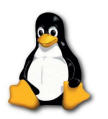Linux

(pronounced: lie-nux or lynn -nix)
Created by Linus Torvalds in 1991 and developed collaboratively over the Internet, Linux is a success story of open source software development. Technically, Linux is actually a kernel (one of the essential components of an operating system) and not an operating system itself; rather, it implements the Unix kernel. The name Linux is derived from "Linus" plus "Unix."
Linux is typically used in combination with the GNU operating system. It was released as freeware for a variety of hardware platforms and became popular on the Internet as the power operating system of choice for many users (even though the operating system is actually GNU-Linux).
Known also as a full-featured Unix clone, it can turn your PC into a workstation. Linux supports an enormous collection of free software, including TCP/IP, EMACS, C, and c++, and it uses applications from the GNU project and the Free Software Foundation. One industry debate that continues to rage on is whether Windows or Macintosh is better, but for many Net users, Linux is the answer.
Linux, the poster child for the open source revolution has become an economic powerhouse. Over one hundred million users of set-top cables boxes, TiVos, Motorola Razrs, and other home appliances use Linux, and over a billion people use it indirectly whenever they access Google, Yahoo, or a myriad of other sites. If you drive a BMW, chances are it's running Linux. Hardware vendors sell over $1 billion worth of Linux servers per quarter. Linux is growing eight times faster than the server market overall, and it has been adopted by big users like the People's Republic of China. IBM, Motorola, Nokia, Philips, Sony and dozens of other companies are dedicating serious resources to its development.


Edit Word